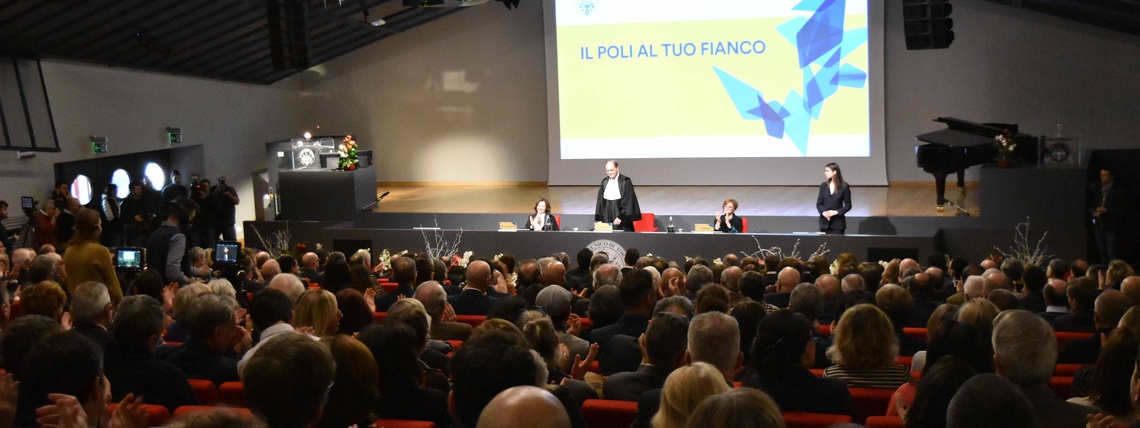The articles of the current edition are available on the new site.

"Our University cannot limit itself to promoting and supporting the innovative processes that take place in society, but it must itself become increasingly capable of innovation and change within itself. Starting from its founding values as a public university - such as: rigour, integrity and openness to collaboration - it will base its action on the achievement of a positive impact on society and the economy, with a spirit of initiative and foresight, promoting a veritable deployment of a critical mass of intentions and actions, together with the local political, social and economic players, without forgetting the national and international dimension". This is how the Rector, Guido Saracco, presented the strategic direction that the Politecnico di Torino will pursue in the next six years, following the guidelines outlined in the Strategic Plan PoliTo4Impact, that was the main topic of the inauguration of the 2018/2019 Academic Year of the University this morning.
The policy guidelines were presented by the Rector to the academic community, to the political world and to civil society, concluding a highly participatory process that led to the definition of the Strategic Plan. The Rector then addressed the President of Confindustria Vincenzo Boccia, Chiara Appendino, Mayor of the City of Turin, Sergio Chiamparino, President of the Piedmont Region and Giuseppe Valditara, Head of the Department for Higher Education and Research, Ministry of Education, University and Research, and ideally the entire local area and the community that works in close contact with the Politecnico:
“The Piedmont area, and the Turin area in particular, is currently marginalised and lagging behind other more dynamic areas. Although Turin is increasingly being characterised as a "university city" capable of attracting students from other Italian and foreign regions, the city offers few opportunities for employment and professional life that encourage them to stay and take root in the area. The industrial fabric of the area must be regenerated, starting from skills and the important competitive factors, still present and vital, thus offsetting the partial disengagement of several large companies from the area, the still poor presence of medium-large enterprises and the fragmentation that characterises a vast fabric of small and medium-sized businesses. On the other hand, there is a clear perception, precisely in this area, of a desire for a "rebirth" that we have not seen for a long time”.
“It is time to give a strong positive impulse to the University, especially from a financial point of view”, augured the Rector, who asked the politicians for the resources to allow the many students who have been trained at the Politecnico to be able to stay after graduation to work in Italy, making a contribution to the development of the country, pursuing that impact that, thanks to its teaching, research and knowledge transfer and sharing activities, the University aims to achieve, as indicated in the new Strategic Plan.
The President of Confindustria Vincenzo Boccia returned to these topics in his inaugural lecture entitled “University and Research. Development and growth levers of companies and society”, in which he outlined the characteristics of the companies of the future - with high added value, high investment intensity, high productivity - and specified that they will have to learn to be excellent in every function to be able to match increasingly fierce competition. Indeed, Italy is the second largest manufacturing country in Europe with 80% of its exports coming from industry. “Which means that, despite the many critical issues that they must face, Italian companies are the best in the world and they could do much more if put in the right conditions. If there is a revolution taking place in our country, this is happening in factories where forward-looking entrepreneurs have invested in digital technologies, responding to the opportunities of Industry 4.0. A measure that should be strengthened and extended to training, especially for young people, in order to align human capital with the physical capital installed and make the acquired technologies truly productive”, affirmed Boccia.
"There is no industry without training open to work and business", concluded the President of Confindustria.
Also the Mayor, Chiara Appendino, the President of the Piedmont Region, Sergio Chiamparino and Giuseppe Valditara, Head of the Department for Higher Education and Research, Ministry of Education, University and Research, underlined the importance of university education for the economic, social and cultural development of the country in their speeches, a concept also reiterated by the students’ representative, Simone Clot.